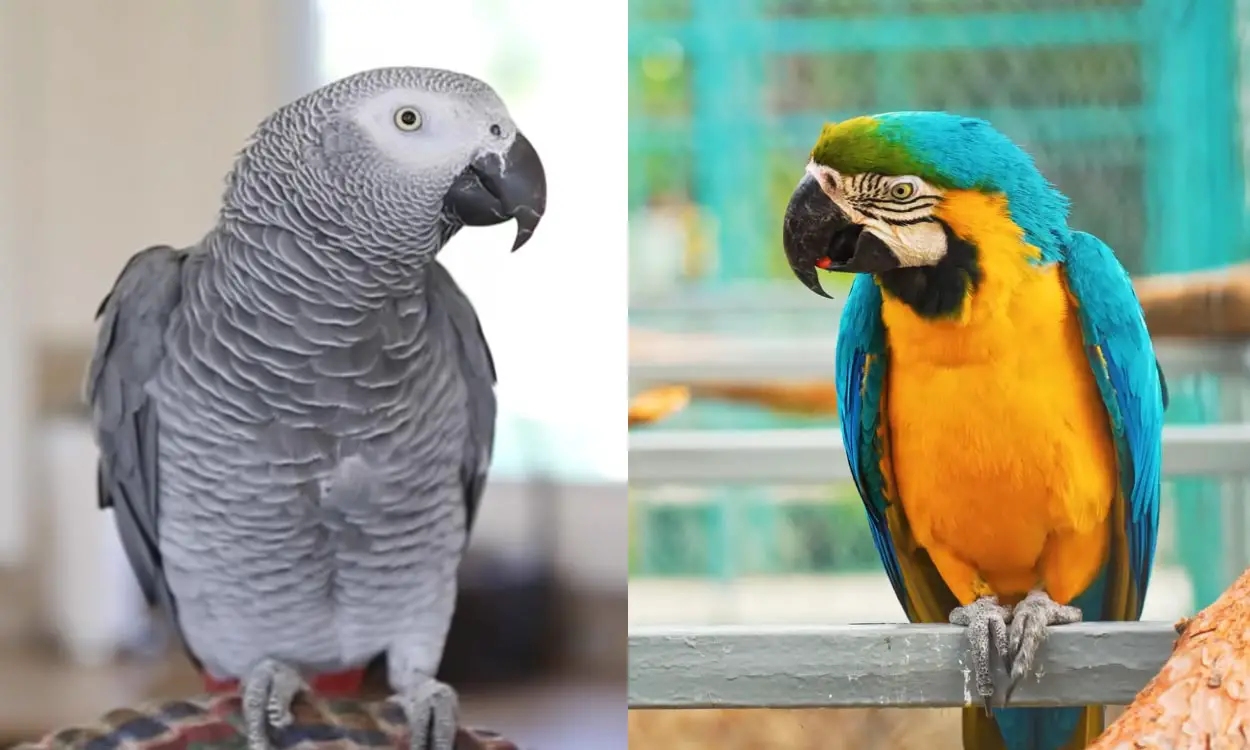Macaws vs African Greys: Which Parrot is Right for You?
When it comes to choosing a feathered companion, the decision often centers around the charismatic Macaws and the intelligent African Greys. These colorful and fascinating birds have captured the hearts of bird enthusiasts around the world. Each species boasts its own distinct traits, making the decision of which to welcome into your home an exciting one.
In this comprehensive comparison, we will delve into the differences and similarities between Macaws and African Greys, shedding light on their personalities, care needs, and other essential aspects to help potential bird owners make an informed choice.
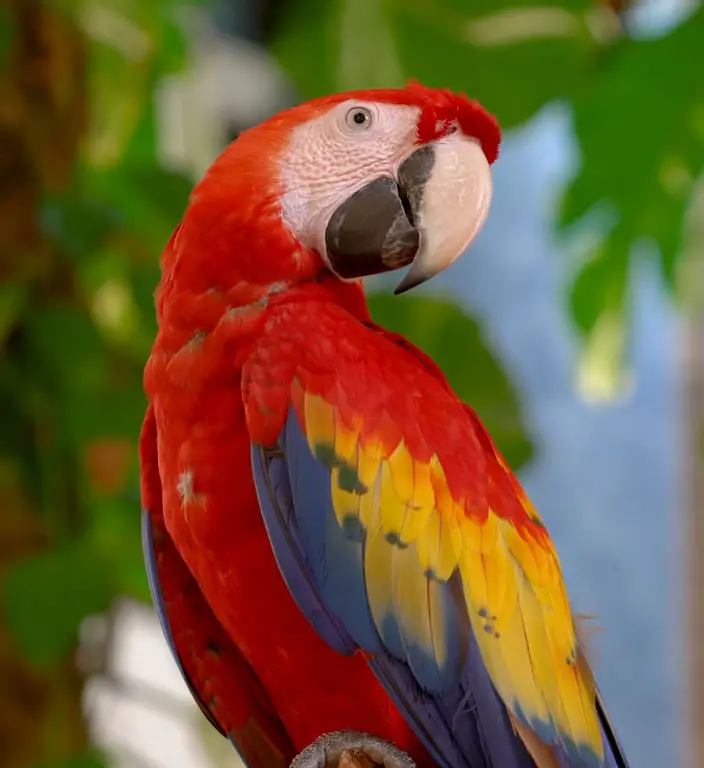
Visual Difference
Macaws and African Greys present a striking contrast in their physical appearance. Macaws are renowned for their vibrant, eye-catching plumage. Their feathers boast an array of vivid hues, ranging from brilliant blues and radiant yellows to vibrant reds and greens. These large parrots display an impressive wingspan and a robust, muscular build, reflecting their active and energetic nature.
On the other hand, African Greys are characterized by their elegant yet understated beauty. Their plumage primarily consists of shades of gray, accentuated by subtle touches of white and flashes of bright red near their tails. The sleek, streamlined body of African Greys is medium-sized, exuding an aura of sophistication and grace.
Related post-Cockatoo vs African Grey: Which is the Best Bird for Your Home?
Personality of the Bird
Macaws are often characterized as extroverted and outgoing companions. They thrive on social interaction and enjoy being the center of attention. These vibrant birds exude enthusiasm and are known for their playful antics, making them lively additions to any household.
On the other hand, African Greys tend to have a more reserved and introspective personality. They are thoughtful and observant, often taking a cautious approach to new situations and people.
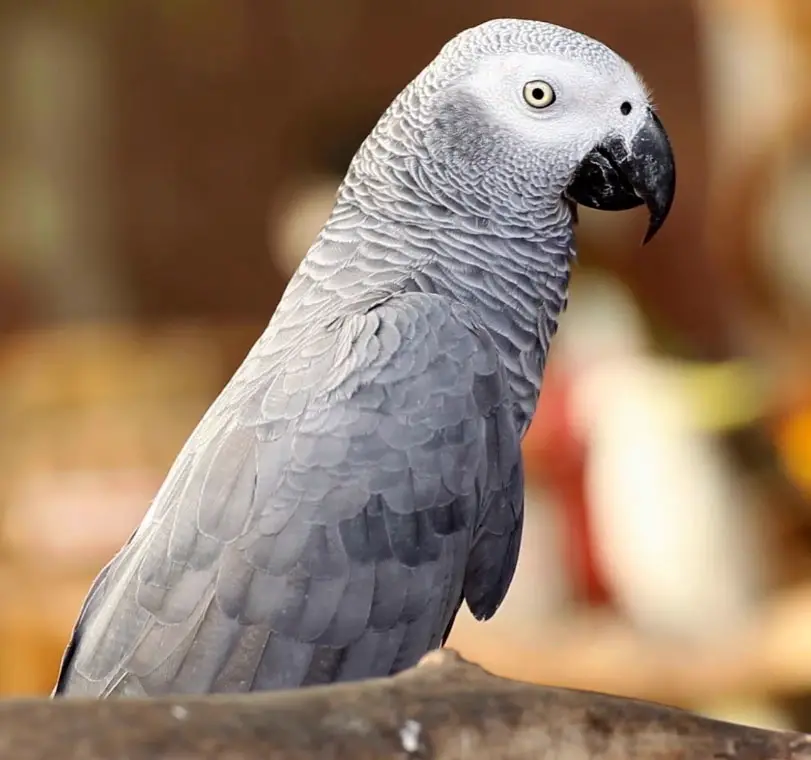
African Greys display a high level of intelligence, showcasing problem-solving skills and a deep understanding of their environment. They may not seek constant attention like Macaws, they form strong bonds with their trusted human companions.
Macaws bring a vivacious and engaging energy to their interactions, while African Greys offer a more thoughtful and contemplative companionship. The choice between the outgoing Macaw and the introspective African Grey largely depends on your preference for a sociable entertainer or a perceptive and intelligent companion.
Biting Issue
Macaws, known for their strong beaks and playful nature, may occasionally exhibit biting behavior. This can be a result of excitement, fear, or a desire to communicate their feelings. Proper training and socialization are essential to manage and minimize biting incidents in Macaws.
African Greys, while generally less prone to biting than Macaws, may also resort to biting when stressed, anxious, or feeling threatened. Their intelligence allows them to assess situations and react accordingly, sometimes resorting to biting as a defensive mechanism. However, with proper training, a secure environment, and positive reinforcement, biting tendencies can be mitigated in African Greys.
Related post-Eclectus Parrot vs African Grey: Which Bird Should You Get?
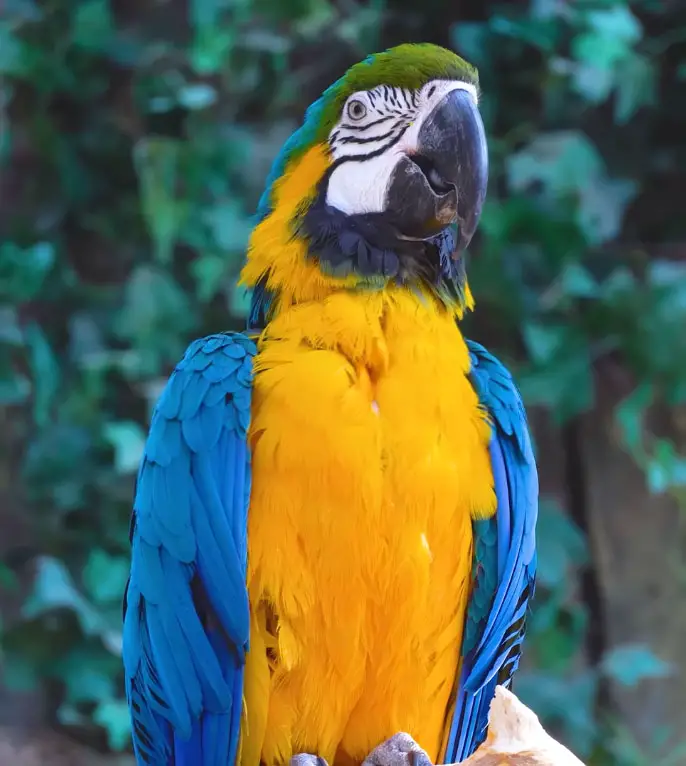
Adaptability to New Environment, Emotional Stability
The adaptability of a bird to a new environment and its emotional stability play critical roles in ensuring a smooth transition and a happy, contented pet. Macaws, known for their sociable nature, tend to adapt relatively quickly to new environments. They are often more open to change, adjusting to new surroundings, people, and routines with enthusiasm. This adaptability reflects a certain emotional resilience and flexibility in Macaws.
In contrast, African Greys may take a bit more time to adapt emotionally to a new environment. They are often more cautious and observant, carefully assessing their surroundings before fully acclimating. This initial caution might imply a certain level of emotional sensitivity, it also indicates a desire for familiarity and a need to feel secure in their surroundings.
It’s important for bird owners to understand these differences in adaptability and emotional stability when bringing a Macaw or an African Grey into a new home. A comfortable and safe environment during the transition period, along with consistent and patient interaction, can significantly support their emotional well-being and help them settle into their new home with ease.
Whether your preference lies with the outgoing Macaw or the thoughtful African Grey, a stable and nurturing environment is crucial for both their adaptability and emotional stability.
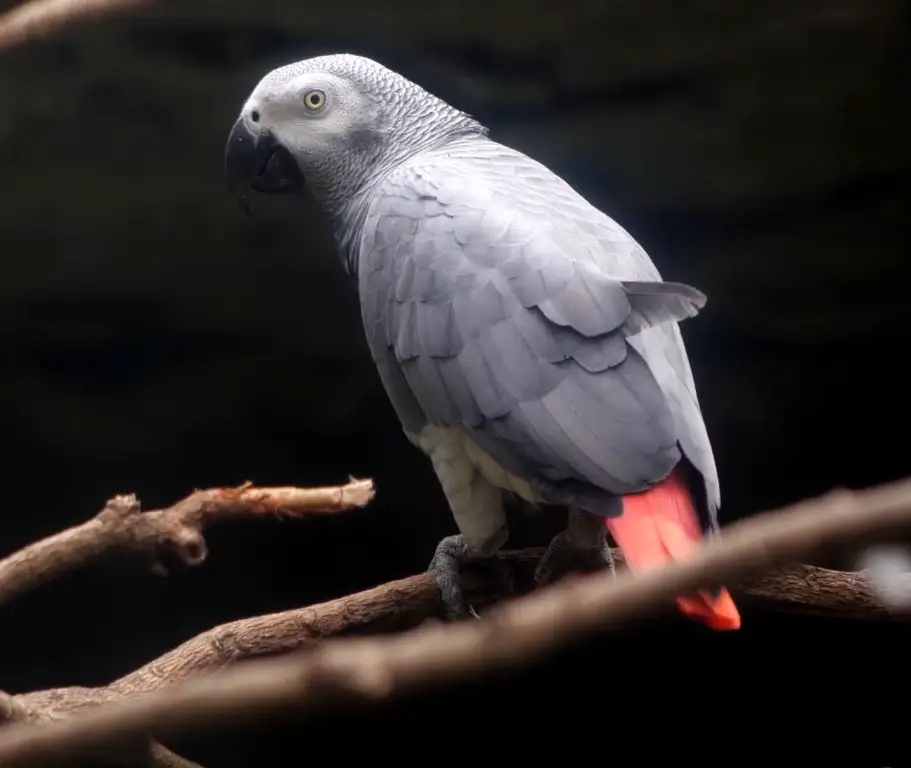
Social or Tend to Bond with Single Person
Macaws are inherently social birds that enjoy interacting with multiple people. They have a natural inclination to form bonds with several individuals within a household, thriving on social engagements and often seeking attention from various family members.
In contrast, African Greys tend to form strong and deep bonds with a single person or a select few. They often display a preference for one primary caregiver, developing a close, intimate relationship with that individual. While African Greys can interact with other household members, their deepest connections and affection are usually reserved for their chosen human companion.
Cuddly, Likes Head/Belly Scratches or Does Not Like Being Held
Macaws, known for their sociable and affectionate nature, often enjoy cuddling and physical closeness. They appreciate head and belly scratches, finding comfort and pleasure in gentle, affectionate touch from their human companions. Being naturally social birds, Macaws often seek out these physical interactions as a way to strengthen their bond with their caregivers.
On the other hand, African Greys tend to have specific preferences regarding physical contact. While they may tolerate being held, they generally don’t seek extensive cuddling or physical affection like Macaws.
African Greys may prefer interaction that doesn’t involve close physical contact, valuing more intellectual engagement and mental stimulation. Understanding and respecting their boundaries regarding touch is essential to ensure a comfortable and trusting relationship.
Related post-Are Macaws Good for Beginners? Everything You Must Know Before Deciding
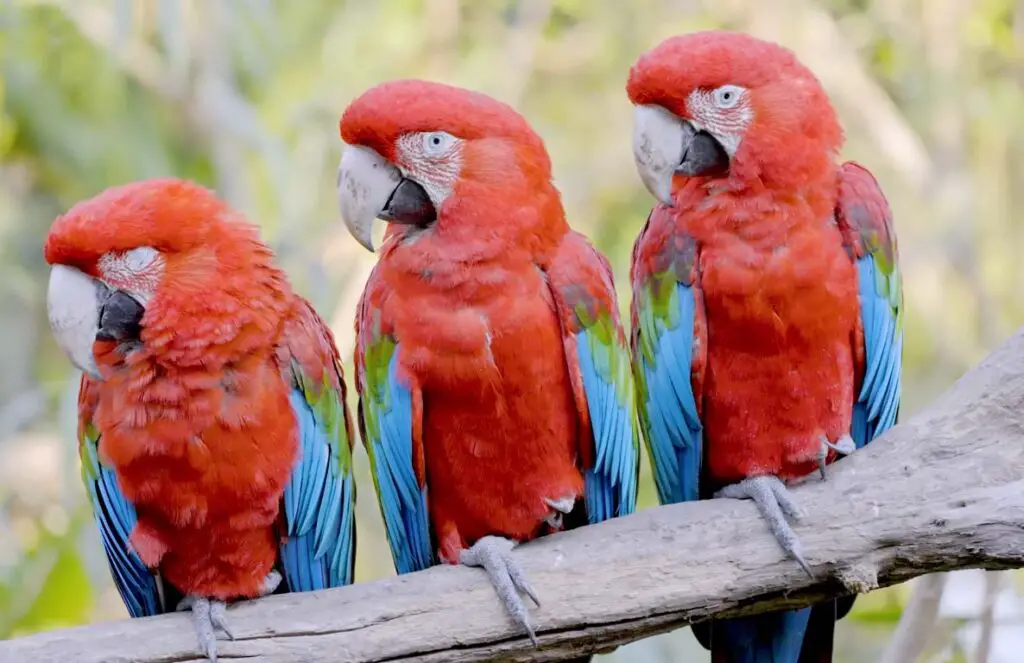
Screaming/Noise Level/Loudness
Macaws are known for their loud and raucous vocalizations. They have powerful voices that can project over considerable distances, making them one of the louder parrot species. Their natural instinct to communicate vocally and their exuberant nature contribute to the noise level in their environment.
Comparatively, African Greys are quieter birds. They have a more moderate noise level and tend to produce melodious and articulate sounds. Sure they can mimic human speech and various sounds, they generally maintain a calmer demeanor and are less likely to disrupt a quiet living environment.
Energy Level of the Birds
Macaws are renowned for their high energy levels. These vibrant birds possess a natural vigor that drives them to be active and playful throughout the day. They require ample space and opportunities for exercise to maintain their physical health and mental well-being.
On the other hand, African Greys exhibit a more moderate energy level. While they are still active and playful, they do not demand as much physical activity as Macaws. African Greys appreciate mental stimulation and interactive toys to keep them engaged, making them a suitable choice for individuals with a slightly more relaxed lifestyle or limited space.
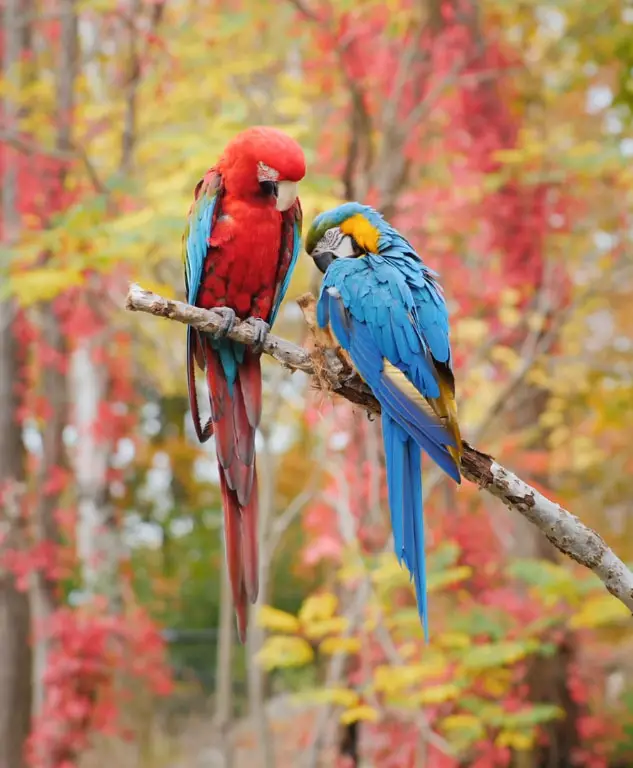
If you have a dynamic, active lifestyle and ample space, a Macaw’s high energy level might complement your routine. Alternatively, if you seek a bird that requires a bit less physical activity and more mental engagement, an African Grey could be the better fit.
Trainability/Intelligence
African Greys are widely recognized for their exceptional intelligence. They possess advanced problem-solving abilities, a keen understanding of language, and an impressive capacity for learning words and phrases. Their intelligence allows them to grasp concepts quickly, making training a rewarding and stimulating experience.
Macaws, while intelligent in their own right, may require more consistent and patient training efforts compared to African Greys. They can learn commands and tricks but may take a bit longer to master them. Positive reinforcement, patience, and repetition are crucial components in successfully training a Macaw and fostering a cooperative relationship.
Talking Ability
African Greys are clear winners here. African Greys are celebrated for their exceptional talking capabilities. They are renowned for their precise mimicry, accurate pronunciation, and ability to understand and use words in context. African Greys often develop an extensive vocabulary and can convey complex ideas through speech.
On the other hand, Macaws, while capable of talking and mimicking sounds, may not reach the same level of language complexity as African Greys. They can learn a variety of words and sounds and may even imitate human speech to a certain extent, but their talking ability is generally less advanced compared to African Greys.
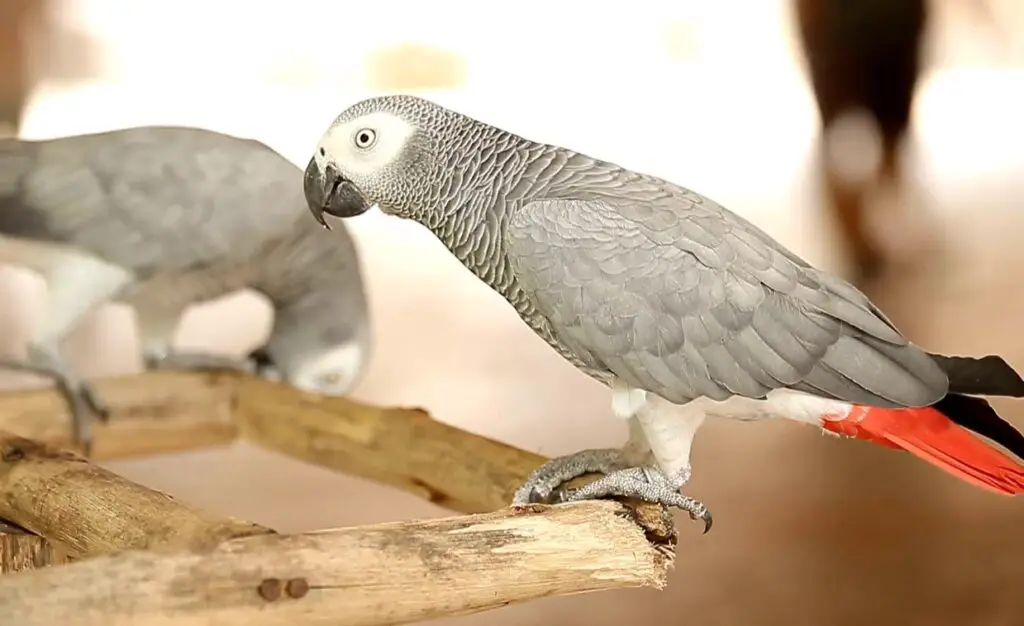
Feather Plucking Issue
Feather plucking is a concerning behavioral issue that can affect the well-being of pet birds, including Macaws and African Greys. African Greys are known to be more prone to feather plucking compared to Macaws. Feather plucking involves the bird plucking and damaging its own feathers, which can result from various factors such as stress, boredom, illness, or environmental changes.
African Greys, due to their sensitive and thoughtful nature, may be more susceptible to experiencing stress or anxiety, leading to feather plucking. Providing them with a stimulating environment, regular mental engagement, and a consistent routine can help minimize the risk of this issue.
While Macaws can also engage in feather plucking, it is comparatively less common among them. Their outgoing and energetic nature may contribute to a reduced likelihood of experiencing stress-induced feather plucking. Nevertheless, providing proper mental and physical stimulation, a well-balanced diet, and regular vet check-ups are essential in preventing this behavior in Macaws as well.
African Greys are more predisposed to feather plucking, highlighting the need for attentive care and an enriched environment. However, both Macaws and African Greys can potentially face this issue, necessitating proactive measures and vigilant observation to maintain their feather health and overall well-being.
Special Care
Macaws, being larger and more energetic, need ample space for physical activity and exercise. Providing a spacious cage and regular opportunities for flying and playing outside the cage are essential aspects of their care. Another issue, Macaws are sensitive to dust, necessitating a clean and dust-free environment to maintain their respiratory health.
African Greys, with their remarkable intelligence, require mental stimulation and social interaction to thrive. Enrichment activities, interactive toys, and regular engagement with their human companions are vital components of their care. Providing a variety of toys and opportunities for mental challenges can prevent boredom and promote a healthy, happy African Grey.
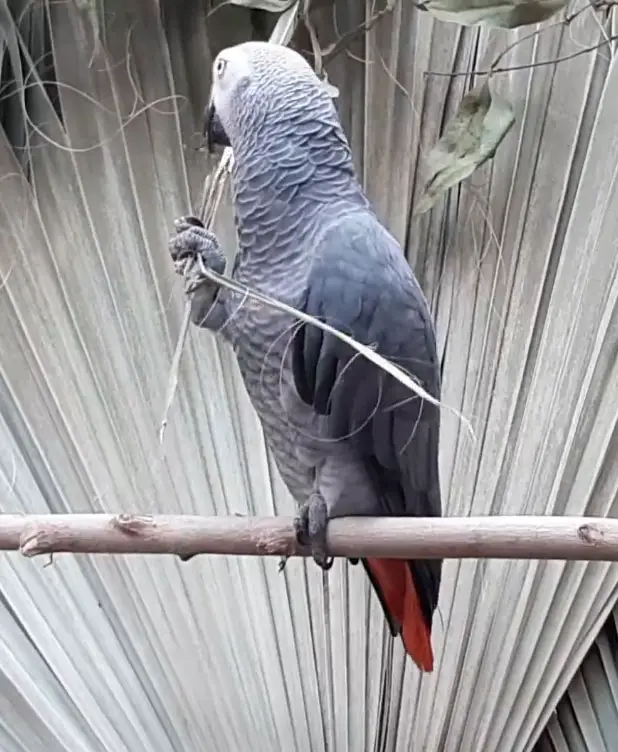
Aggression Toward Other Birds, Cage Aggression
Macaws can exhibit aggression towards other birds, especially when introduced to a new bird or if they feel their territory is threatened. Proper introduction and gradual acclimatization to other birds are necessary to minimize aggressive behavior in Macaws.
Similarly, African Greys can also display aggression towards other birds, particularly if they feel stressed or threatened. It’s essential to monitor their interactions and provide a safe and spacious environment where they have their own space and don’t feel crowded.
Cage aggression is a common issue in both Macaws and African Greys. Birds may become possessive of their cage, displaying aggression when someone approaches or tries to handle them near their cage. It’s important to respect their territorial instincts and approach them calmly and patiently, allowing them to feel secure in their cage.
Related post-Timneh African Grey vs Congo African Grey: Which Bird To Get?
Health Concerns
Macaws are generally hardy birds, but they can be susceptible to respiratory issues due to their sensitivity to dust and environmental pollutants. Individuals with respiratory problems like asthma should exercise caution and ensure a clean, well-ventilated living space for their Macaw. It will minimize potential health concerns.
African Greys are prone to certain health issues, with respiratory problems being a notable concern due to their dust-producing feathers. Caregivers with respiratory conditions should take precautions and maintain a clean living environment to minimize potential triggers. African Greys are susceptible to vitamin-A deficiency. A well-balanced diet with ample vitamin-A-rich foods essential to their health.
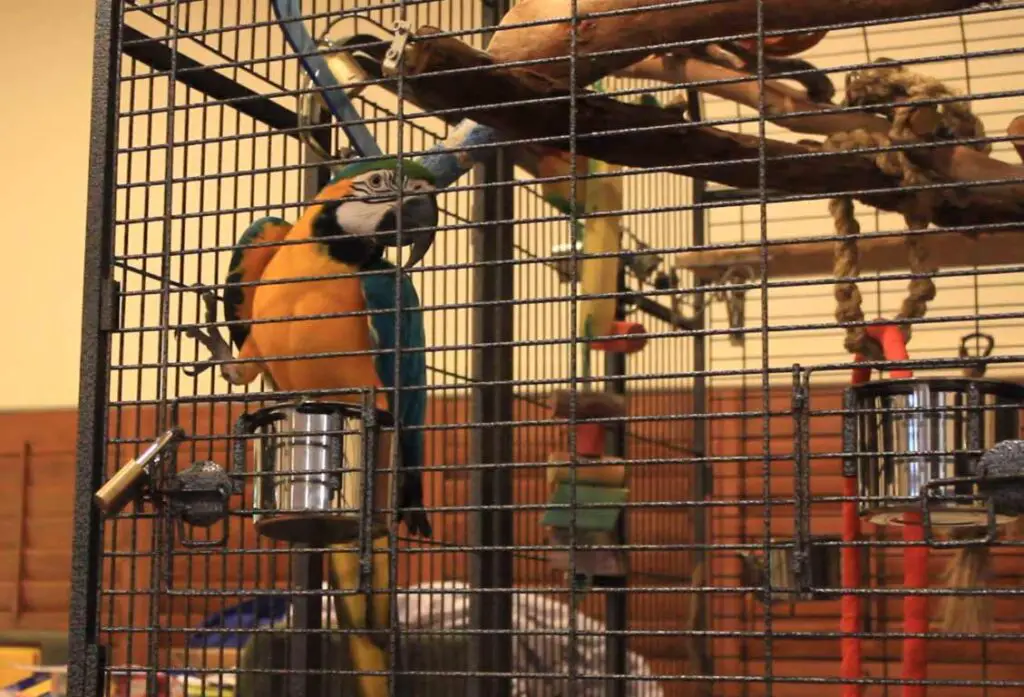
Housing Around Children
Macaws and African Greys can coexist with children, but certain precautions and considerations should be taken into account.
Macaws, with their larger size and more exuberant nature, may require extra caution around young children. Their playful antics and high energy level can be overwhelming for small kids. A secure and designated space for the Macaw’s cage and play area can help minimize any accidental interactions that could lead to potential injuries.
African Greys, being more reserved and less boisterous, may be a better fit for families with young children. Their moderate energy level and thoughtful demeanor can create a calmer and more manageable environment around little ones.
Educating children on how to interact with birds respectfully and gently is essential for their safety and the well-being of the bird. Supervision during interactions and teaching children to approach the birds calmly can prevent accidents. It will foster a positive relationship between the children and the birds.
Food Habit
Macaws are generally good eaters. They have a diverse diet that includes a mix of high-quality pellets, fresh fruits, vegetables, nuts, and seeds. They thrive on a varied diet, and providing a range of nutritious options is important to meet their nutritional requirements.
African Greys, on the other hand, can be picky eaters. Encouraging a well-balanced diet from an early age is essential to prevent them from developing preferences for specific foods. They should be offered a variety of fruits, vegetables, pellets, and occasional nuts to ensure they receive adequate nutrition.
Final Suggestion
Ultimately, the decision to choose between a Macaw and an African Grey should align with your lifestyle, living situation, and the level of interaction and care you can provide. If you are prepared for an energetic, sociable companion and have the space for their activity, a Macaw could be an excellent choice. However, if you value intelligence, a more reserved temperament, and a bird that appreciates mental stimulation, an African Grey might be the perfect fit.
Regardless of your choice, investing time in understanding their needs, providing proper training, mental stimulation, and a loving environment will ensure a fulfilling and enriching relationship with your avian companion. Both Macaws and African Greys have unique qualities that can bring joy and companionship to your life. So choose based on what resonates best with your preferences and circumstances.
